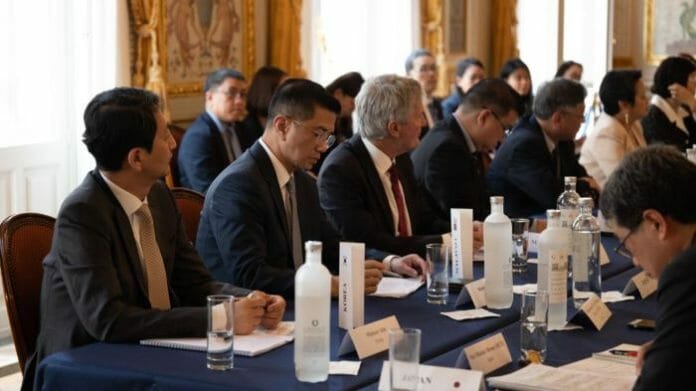Senior Minister and Minister of International Trade and Industry, Dato’ Seri Mohamed Azmin Ali has called for a new paradigm of the 21st century in rewriting the rules to ensure faster and fairer growth for economies in the region, as well as
foster inclusivity and shared prosperity.
He made the call at the informal Ministerial meeting of the Indo-Pacific Economic Framework for Prosperity (IPEF) held in Paris where 13 other partner countries also participated. The meeting was chaired by United States Trade Representative H.E. Ambassador Katherine Tai.
In his intervention, Dato’ Seri Azmin reiterated Malaysia’s position that a Framework is indeed a vital tool of economic diplomacy in forging further linkages between the U.S. and the Indo-Pacific region. The Senior Minister said that as the world moves toward greater convergence of issues across the board, the IPEF’s strategic and economic significance lies in its strengthening the region’s trade ecosystem, providing the impetus to drive economic engagement and cooperation.
On the Trade Pillar, a key principle under IPEF’s priority concerns, Dato’ Seri Azmin urged for collaborative resolution of trade issues through consultation and dialogue as such an approach would resonate with the region at large. In addition, technical assistance and capacity building must constitute an integral part of the framework failing which “the mantra of inclusivity for all Framework partners will ring hollow and plurilateral economic cooperation for regional prosperity will be illusory.” With regard to the imperative for ground rules to ensure more efficient deliberations via a more dynamic and comprehensive negotiation process, the Senior Minister proposed that flexibility, i.e. special and differential treatment, should be accorded “to ensure that the application of rules and provisions produces fair and equitable outcomes. This is crucial considering the differences in socio-economic development status among the Partners.”
The Partners were apprised of Malaysia’s progress and advances made in the ratification of conventions on labour practices, including the ILO Protocol 29 and the introduction of multiple legislation, the most recent being the passing of the Employment (Amendment) Act 2021 on 30 March 2022 to protect the rights of foreign workers, including prevention of forced labour, payment of wages via bank accounts and protection to all workers. Malaysian authorities also have taken proactive action by way of enhanced statutory and enforcement measures to ensure compliance with international labour laws and regulations, particularly the Employees’ Minimum Standards of Housing, Accommodation and Amenities Act,
the Senior Minister added. As for supply chain resilience, he stressed that it is vital to facilitate seamless flow
of trade at the regional level, pointing out that the recently signed MOC on Semiconductor Supply Chain Resilience between Malaysia and the U.S. is therefore a strategic move to deal with contingencies and uncertainties.
Malaysia is also professing steadily on digitalisaon with the National Digital Economy Blueprint that can drive the transformation agenda for the nation to become a vibrant digital economy.
Addressing corruption, the Senior Minister highlighted that it remains one of the main global issues which require coordinated solutions and international cooperation, stressing that Malaysia, which places great importance on good
governance, transparency, accountability, effectiveness and efficiency, has been a party to the UN Convention Against Corruption since its inception. “Hence, we remain committed to combating corruption,” he said adding that significantly,
Malaysia has identified 115 initiatives under the National Anti-Corruption Plan (NACP) 2019-2023, which was developed to transform Malaysia into a corruption free nation.
Dato’ Seri Azmin further pointed out that through the Framework’s Tax & AntiCorruption Pillar, Malaysia’s existing anti-corruption structure could be further enhanced with the caveat that the Tax element should be separated from the best Anti-Corruption component, so as to allow for more nuanced and impactful deliberations.









